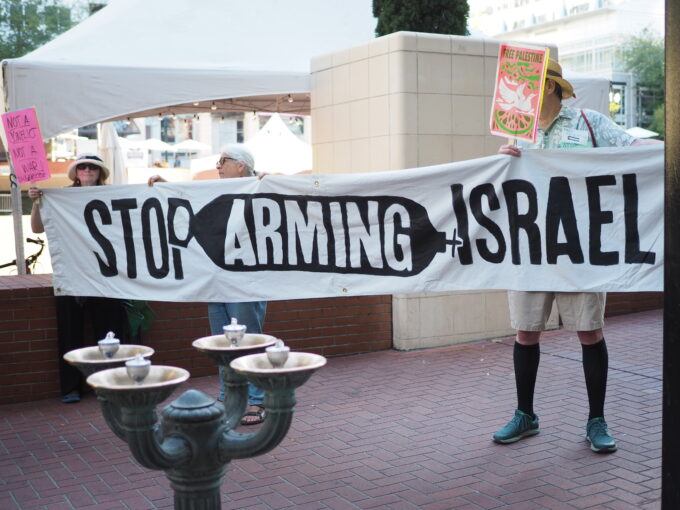








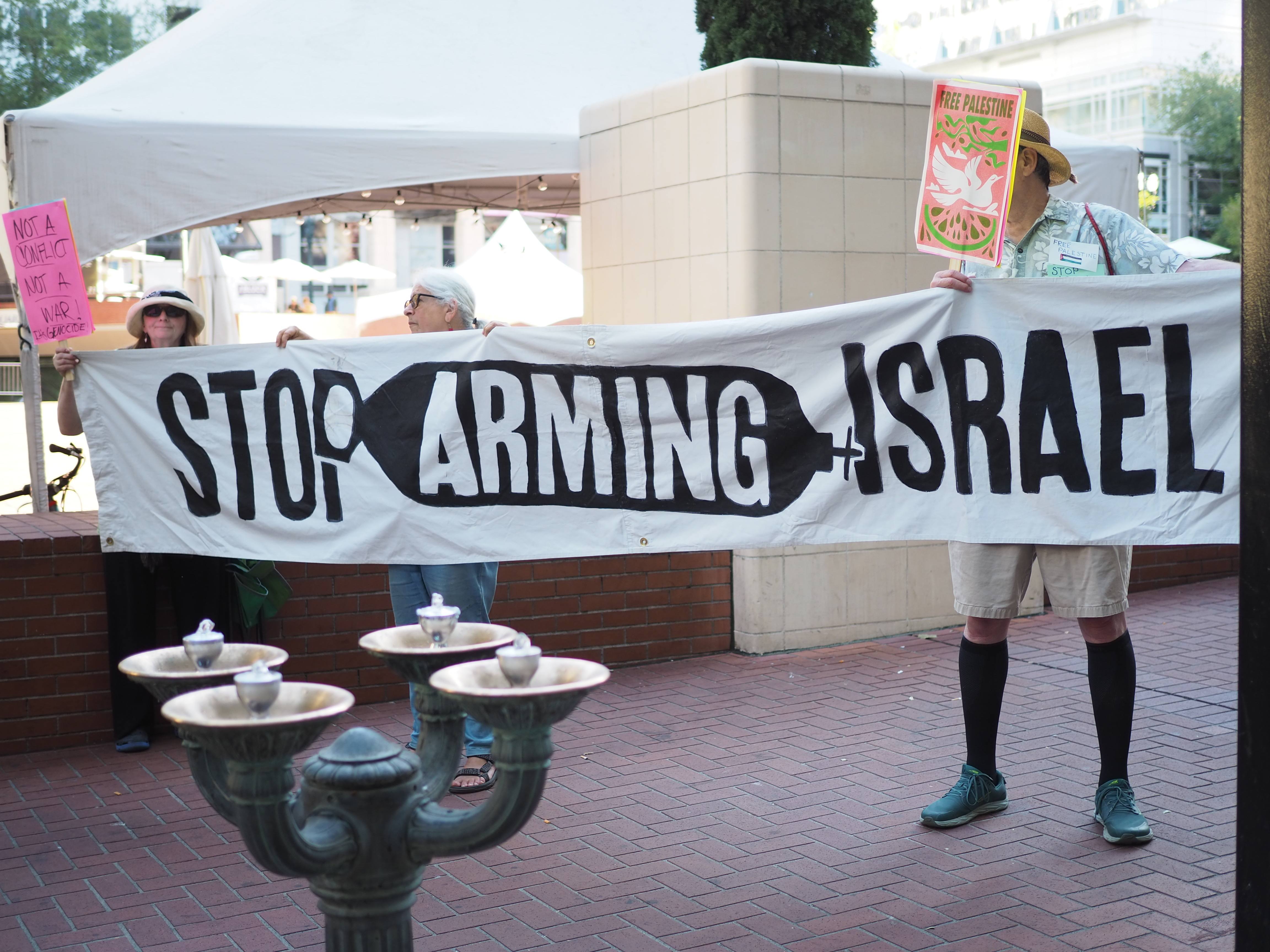


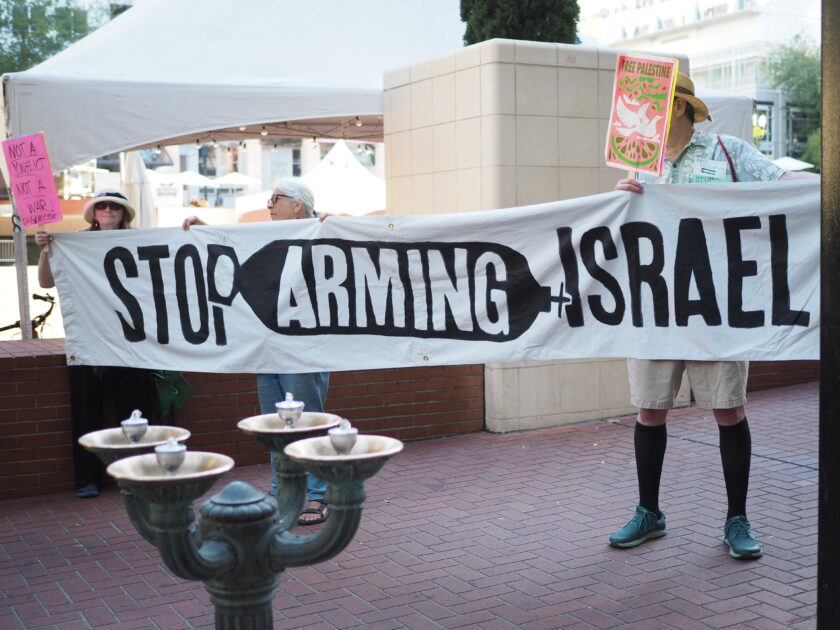

































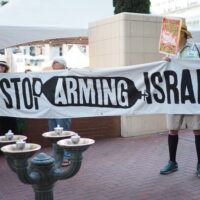




















Photograph by Nathaniel St. Clair
The Palestinian armed resistance has defended Gaza for almost two years now, successfully preventing Israel from expelling two million people from their homeland. But, outgunned as they are by Israel’s technology and its unlimited supply of war matériel from the United States, the resistance fighters now need the world’s help—and soon—to drive out the Israeli occupation forces and end the genocide. There’s a realistic mechanism to make that happen under United Nations auspices, so a growing global movement is now demanding that the UN get off its butt and come to Gaza’s rescue.
Palestine’s Armed Resistance Hasn’t Let Israel “Finish the Job”
At this stage of the Gaza genocide, the Israelis’ ostensible goals are (a) to free the captives who remain in Gaza, all of whom are soldiers (that is, prisoners of war) and (b) to “destroy Hamas.” But its leaders have repeatedly made clear their true intentions: to nix all ceasefire proposals as they proceed to completely empty the Gaza Strip of its Palestinian population through some combination of mass killing and expulsion.
To “destroy Hamas,” as they put it, the Israeli Occupation Forces (IOF) would have to fight the organization’s armed wing—the Al Qassam Brigades—and its allied resistance groups in person, on their turf. Instead, out of cowardice, the Israelis have largely avoided direct engagement, instead turning all their firepower on Gaza’s civilian population and its infrastructure for sustaining life and health.
When Israeli troops have dared to enter Gaza and tried to occupy the camps and cities (instead of just bombing them into rubble), the resistance forces have inflicted heavy casualties on them and destroyed or disabled large numbers of their tanks, armored personnel carriers, and bulldozers. As recently as September 15, the Israeli military’s chief of staff admitted to Prime Minister Benjamin Netanyahu in a cabinet meeting that “even after the operation to capture Gaza City, Hamas will not be defeated militarily and administratively.”
In all ceasefire negotiations, Israel has demanded that the resistance forces, whom they have failed to defeat militarily, must nevertheless surrender and be disarmed. All the while, in other venues, Zionist leaders are declaring their intention to continue bombing, shooting, and starving Palestinian civilians as part of a campaign to drive them south, herd them into concentration camps near the border with Egypt, and from there, forcibly remove them to various countries in Africa and Asia—in Zionist leaders’ terms, to “finish the job.”
That phase of the genocide would be much further advanced today had there been no armed Palestinian resistance doggedly thwarting IOF troops’ attempts to capture and hold large areas of Gaza. If the resistance forces were now to give up that struggle, IOF efforts to slaughter, starve, imprison, and expel Gaza’s civilian population could and would shift into overdrive. As the Electronic Intifada’s Ali Abunimah has starkly put it, Western governments can demand that the resistance give up their weapons “till the cows come home,” but “they’re not going to, because they know that would ensure the ‘Final Solution’” for the people of Gaza. (at 2 hr 38 min)
UN General Assembly to the Rescue?
While Palestine’s national liberation forces have succeeded in foiling the IOF’s attempts to steal and depopulate Gaza, the fighters don’t have the resources required to drive out a large, genocidal army, lavishly supplied with US weaponry, or to keep Israelis off their land and out of their airspace, let alone break the 18-year-long siege of the territory. But if enough nations, ones that are not complicit in the genocide, join forces, they could stop it.
When a genocide is in progress, nations have a duty under international law to try to stop it. So far, Yemen’s de facto government, Ansar Allah, with its missile attacks on Israeli ships, military installations, and airports, is the only one taking its duty to intervene in this genocide seriously. Although the Yemeni people are paying a heavy price for their humanitarian intervention, their solidarity with Palestine has grown even stronger.
One such ally, of course, is not enough to end the genocide. The Palestinian people need a large international armed force to converge on Gaza by air, sea, and land, to join the resistance fighters in protecting the civilian population and putting an end to the genocide. And, as luck would have it, there’s a little-known, decades-old mechanism for doing just that: UN General Assembly Resolution 377 (V), adopted in 1950 under the title “Uniting for Peace.”
Uniting for Peace authorizes the General Assembly to request that its member nations intervene in cases of military aggression when the Security Council fails to act (which the council always does when it comes to Israel, thanks to the US veto). By a two-thirds majority, the General Assembly (in which each member nation has one vote and there are no vetoes) can pass a resolution enabling the formation and deployment of a multinational military force to come to Gaza’s rescue.
And that might just happen. Spurred by a clamor from global civil society, the UN may consider an armed-intervention resolution this month, during the 80th Session of the General Assembly in New York City.
A Uniting for Peace resolution can kick off a joint effort among nations to take any of a range of actions, such as imposing sweeping sanctions and military embargoes against Israel or even expelling it from the UN. Most importantly, the 1950 resolution authorized the General Assembly to make “appropriate recommendations to Members for collective measures, including in the case of a breach of the peace or act of aggression the use of armed force when necessary, to maintain or restore international peace and security.”
Experts urge that stopping the genocide requires adopting a resolution that mandates the deployment, at Palestine’s request, of a multinational protection force to Gaza. These troops would be empowered to “protect civilians, open entry points via land and sea, [and] facilitate humanitarian aid,” along with forcing Israel’s complete withdrawal from Gaza’s territory, coastal waters, and airspace, while preserving evidence of its war crimes, crimes against humanity, apartheid, and genocide.
Once such a resolution is passed, the UN Secretary-General is required to invite member nations to contribute troops, equipment, and supplies to the military force, which must then be quickly assembled and deployed.
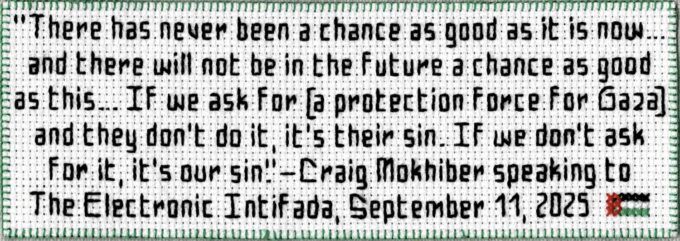
Image: Priti Gulati Cox. See more such bookmarks at her resistance embroidery initiative, which supports The Sameer Project in Gaza.
Prevailing Against US-Israel Obstruction
Craig Mokhiber, a former senior UN official who resigned in October of 2023 while warning that genocide was coming to Gaza, is one of the most prominent advocates for a UN resolution to deploy an armed protection force. In a Middle East Eye article last month, he stressed that the genocide being wrought by Israel “requires intervention, the State of Palestine has invited intervention, and Palestinian civil society has appealed for intervention.” A multinational military force, he wrote, is necessary to help the Palestinian people out of this immediate crisis. But in the longer run, he added, “genocide (and apartheid) will only end through resistance against the Israeli regime, the steadfastness of the Palestinian people, the solidarity of the rest of the world, and the isolation, weakening, defeat, and dismantling of the Israeli regime.”
Mokhiber is optimistic that the resolution can get ‘Yes’ votes from the required two-thirds of General Assembly members. However, he warns,
The U.S. and the Israeli regime will use every available carrot and stick to try to
prevent the securing of the necessary two-thirds majority, seeking to water down the text, and bribing and threatening states to vote no, to abstain, or to be absent for the vote. The current lawless government in Washington may even threaten sanctions on behalf of the Israeli regime, as it has already done vis-à-vis the International Criminal Court and the UN’s Special Rapporteur. And they are likely to try to obstruct the protection force itself, once mandated.
Mokhiber doesn’t say so explicitly, but it seems to me that any US-Israeli attempt to “obstruct the protection force” could include a range of actions that might well lead to direct armed conflict with the protection force.
Alfred de Zayas, a former UN Independent Expert on International Order, explained in a recent CounterPunch article why “Israel has no authority, no sovereignty, and no rights in Gaza or in the West Bank,” while UN-approved troops would be in Gaza legally at the request of Palestine. But the occupiers have broken every other international law they’ve encountered, so it would be no surprise if they were to attack the UN’s protection force, which, I presume, would be authorized to fight back in defense of themselves and the civilian population.
I haven’t seen anything in the various calls for a Uniting for Peace resolution regarding specific actions the protection force would be allowed to take. Mokhiber has said that the troops would be dispatched to protect Palestinians, not attack Israelis. It seems to me, though, that if they’re to carry out their protective mission, UN troops must be authorized to enforce a no-fly zone over Gaza and shoot down Israeli aircraft that violate it.
I’m way out on a limb at this point, but if a no-fly zone is not permissible, I think it should be. As the Palestinian resistance has shown, the IOF are effective fighters only when they’re in the cockpit of a fighter-bomber or sitting safely back at their home base controlling a drone. They’re not good at fighting on terra firma. With a no-fly zone in place, therefore, the multinational force could be highly effective in protecting Gaza’s civilian population, pushing out the Israelis, and helping bring a surge of humanitarian aid, other supplies, and infrastructure into the territory.
I’ve felt a little more optimistic that IOF troops can be purged from Gaza without setting off full-blown armed conflict since hearing Craig Mokhiber discuss prospects for a protection force on The Electronic Intifada’s livestream of September 11. He cautioned that with the General Assembly session starting soon in New York and the many possibilities being discussed, the creation and deployment of a protection force is far from guaranteed. But, he imagined, “if a force made up [hypothetically] of Spanish, Irish, Slovenian, South African, Namibian, Kenyan, Malaysian, and Indonesian contingents sailing under a UN flag” approaches Gaza, it is “not obvious that Israel would be in a position to attack such a force.” And if Israeli forces do attack the UN troops, he added, even more nations might be inspired to join the intervention.
Whatever the chances that an armed protection force can be successfully assembled and deployed, Mokhiber concluded, civil society around the world must demand as loudly as possible that the UN establish and deploy an armed protection force for Gaza.
“If we ask for it and they don’t do it,” he said, “it’s their sin. If we don’t ask for it, it’s our sin.”
The post Stopping the Genocide Requires an Armed Protective Force appeared first on CounterPunch.org.
This post was originally published on CounterPunch.org.